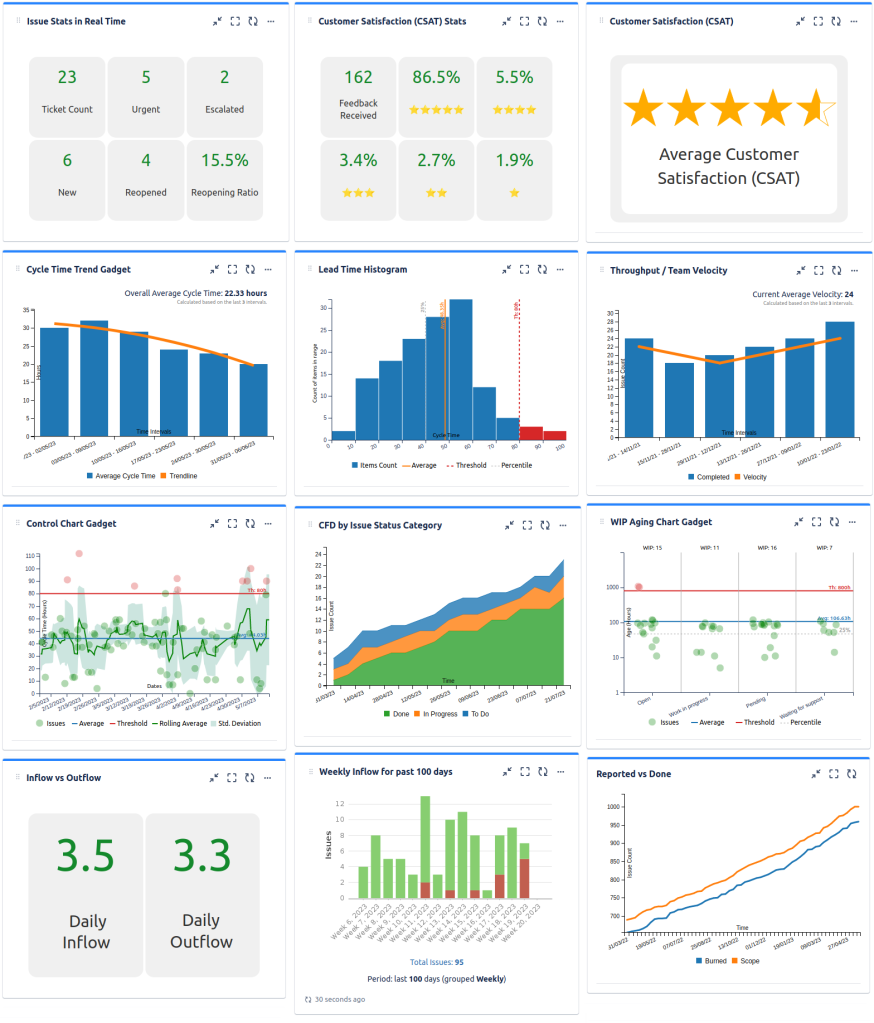Community resources
Community resources
Community resources
- Community
- Q&A
- Jira Service Management
- Questions
- JSM new project - setup for support teams
JSM new project - setup for support teams
Hello,
I'm setting up a new JSM project for 2 finance service teams. The two teams share responsibility for handling incoming requests. The management wants to be able to quantify SLAs for both teams portions of the workflow.
Example:
Issues come in and are triaged by Team A. The issue is then assigned to Team B for action. Once Team B is done, the issue is then sent back to Team A for more work and then closure.
The management want to be able to see metrics on how much time each team takes with their respective tasks on the issues. I've been trying to figure out how to facilitate these metrics by designing a Workflow and Team assignments so I can generate these metrics.
Does anyone have a suggestion on how to approach this?
Thanks
Jamie
2 answers
Hello @Jamie Gordon ,
Jira does not provide this functionality out-of-the-box. All the data needed for this report is available in each issue's history but you will need to use a marketplace app to get ready-to-go reports.
Our team at OBSS built Timepiece - Time in Status for Jira for this. It is available for Jira Server, Cloud, and Data Center.
Time in Status mainly allows you to see how much time each issue spent on each status, each assignee, or each user group.

There are two types of reports in Time in Status that will fit your case.
First, there is a report named Group Duration. This report lets you select one or more user groups from your Jira, calculates the time when each issue was assigned to a member of those groups, and shows the total assignee-time for those groups separately.
The second option is the Any Field Duration report. For this report to work, you should create a custom field and name it something like "Assigned Group". You modify your workflows so every time an issue is assigned to a team, the value in this field (either by a workflow post-function or a manual entry by the user) is modified to display the name of the assigned team. When you do that, you can use Time in Status's Any Field Duration report to see how long that field held different team names.
For all numeric report types, you can calculate averages and sums of those durations grouped by the issue fields you select. For example total in-progress time per customer or average resolution time per sprint, week, month, issuetype, request type, etc. The ability to group by parts of dates (year, month, week, day, hour) or sprints is particularly useful here since it allows you to compare different time periods or see the trend.
The app calculates its reports using already existing Jira issue histories so when you install the app, you don't need to add anything to your issue workflows and you can get reports on your past issues as well. It supports both Company Managed and Team Managed projects for Jira Cloud.
Time in Status reports can be accessed through its own reporting page, dashboard gadgets, and issue view screen tabs. All these options can provide both calculated data tables and charts.

Timepiece - Time in Status for Jira
EmreT
Hi @Jamie Gordon,
You can easily do this with the gadgets offered by our Great Gadgets app.
It offers some gadgets that allow you to measure essential metrics like cycle time, lead time, or time between workflow statuses. These gadgets are Cycle Time Trend, Control Chart and Histogram Chart.
Have a look over this article from our blog An effective dashboard for Service Desk and Customer Support teams in Jira Service Management to see how to do this, and what other JSM/ITSM metrics you can track with this app.

For example, the Cycle Time Trend gadget can display the average cycle time (or SLA) for a team per past time intervals, as well as the overall average. 
You can configure one gadget to measure from "issue creation" to "triage". This way, you will display the SLA for the "Triage Time - TEAM A" part of the workflow.
Then, from "In Progress" to "Resolved". This way, you will display the SLA for the "Cycle Time - TEAM B".
Then, from "Resolved" to "Closed". This way, you will display the SLA for the "Closure Time - TEAM A" .
If you need any assistance in configuring this, please don't hesitate to contact our Support Team at support@stonikbyte.com.
Thank you,
Danut Manda
You must be a registered user to add a comment. If you've already registered, sign in. Otherwise, register and sign in.






You must be a registered user to add a comment. If you've already registered, sign in. Otherwise, register and sign in.